Distress is rarely caused by one single stressful incident. It is invariably caused by a combination of stressful events and changes in the resources you have available to manage the stress. So let me describe in graphical form how stress develops over time.
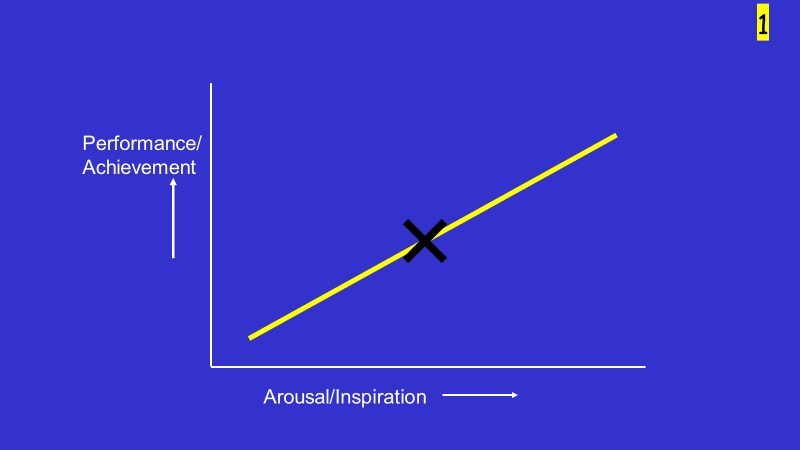
In slide 1 the X axis, across the bottom, is about your resources – this is a measure of how much you are inspired, motivated, aroused and equipped to take action and face the challenges life brings. The Y axis, the vertical axis on the left, refers to how well you respond to the stressful events you face – the demands and challenges of life. As expected there is a correlation between your resources and how well you respond – the more you are aroused and inspired the better you perform – but it is not a simple or direct relationship.
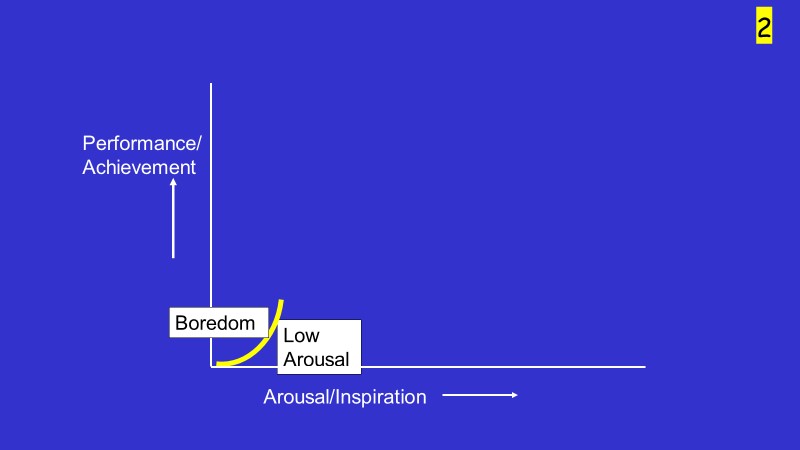
Consider what happens when you have little to do as in slide 2. That means you have little motivation to improve the quality of your performance so you are inefficient. This is a common situation at the beginning of employment, perhaps when you were an apprentice. You may not have known what to do, you had not yet learned appropriate skills to do the job and your trainers may have found it easier to do the job themselves rather than train you. It can happen too, later in your career when you are employed at a job for which you are over-qualified. The job does not stimulate so you are bored. As a result you get by and do what you have to do but are not interested in it so your performance may be abysmal. If you have not been there it may be hard to imagine such situations being stressful. In fact, when in the middle of a multitude of stressful claims you may be quite jealous of friends who are unemployed or even of the homeless man dozing on a park bench in the summer sun. They have their stresses too!
The other common situation of low arousal/low performance is when on maternity or paternity leave. No adult conversation all day and a bawling, puking, pooing, smelly parasite to care for. (Oops! What will people think if I say that out loud?) Well, I have said it for you. This does not apply to every parent, of course, but it is the way some parents feel and if this is you, you cannot do anything about it unless you bring it into the open and admit it is true, even if only to yourself.
All these experiences can be stressful and it is stress that is characterised by frustration, restrained anger (it can be embarrassing to admit you feel angry when other people think you are having a fulfilling and easy time) and anxiety. You may even be certain you have made a terrible mistake in the ordering of your life.
We will come back to what you can do about such stressful times but for now consider what happens as the demands on your time and energies increase, for life goes on.
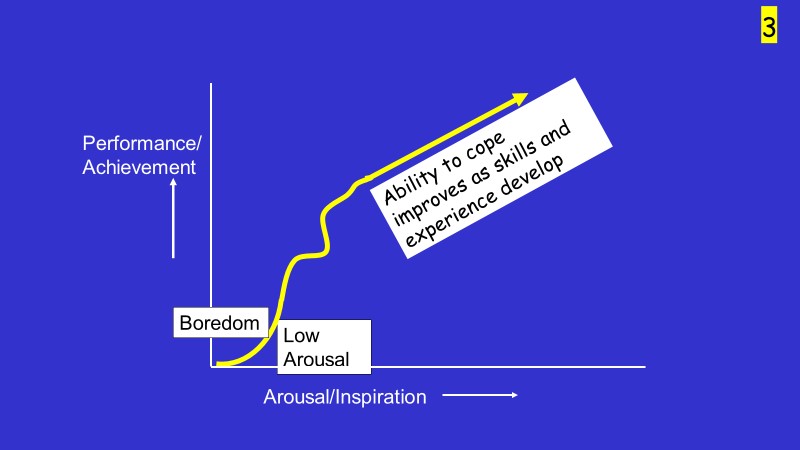
You move out of the low arousal/boredom stage as in slide 3 – if you have ever been in it – some folk skip this stage. The activities of life including work, developing friendships, sports and hobbies, getting married, having children, holidays, coping with illness, financial troubles, work problems, housing issues and all the rest, take over. You often do not know how to manage but you work it out as you go along, learning from others, by trial and error, checking a few YouTube videos and burying a few mistakes you hope no one will ever find. At its core, this is because you are aroused, interested and motivated. Your abilities develop and you achieve your goals (well, some of them). And even when you do not achieve your initial goals you may well be content with what you have achieved. I am referring here to the normal development of your life interests. As life moves on your life concerns change, some are no longer an issue but others take their place (babies become teenagers, for example). The list never ends but they are all normal parts of life. And this is where stress arises. Stress, really, is another word for normal life.
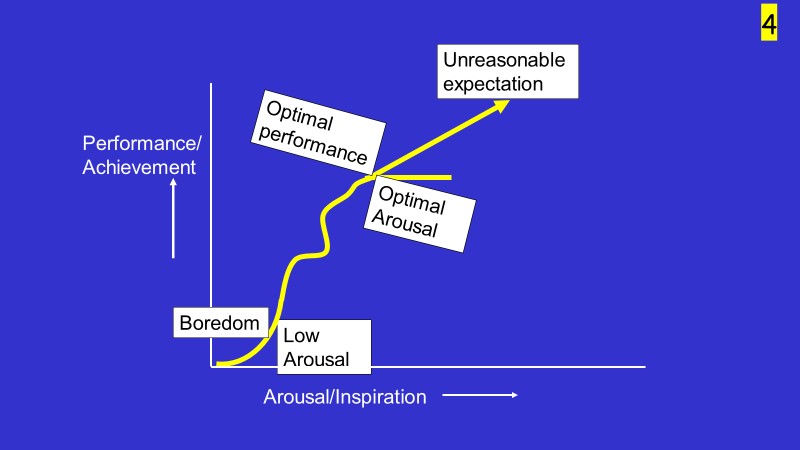
It is a normal human failing that you expect you can go on like this forever, but there comes a point, as in slide 4, when you have enough to manage and are functioning at an optimum level. This will not be your maximum capacity but it is at a level that you can sustain and cope with minor glitches. Optimal arousal results in optimal performance. Minor glitches can be scary at the time but you survive and can easily presume that that is the way life will continue. So you are still excited, interested, aroused and inevitably take on more, or maybe are expected to take on more. Yet you cope, for your ability to manage (perform) functions at a satisfactory level as you become more efficient and experienced. Few of us seem able to recognise when we are operating at optimal levels and therefore avoid taking on too much. It is all too easy to assume we can keep coping whatever the demand on our time, energy and resources.
You may keep going like this for ages but inevitably, there will come a time:
when you take on one task too many,
or you are ill and cannot keep on top of everything,
or you lose an essential support
and so on.
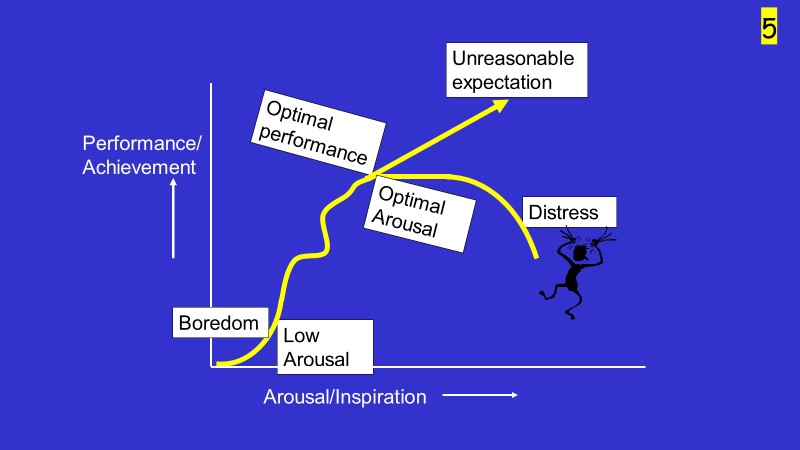
Your personal resources will become diminished and you can no longer keep up your performance. You are in trouble, serious trouble, as in slide 5. Stress has become distress. This can come on suddenly, even overnight, if there is a sudden, unexpected and extensive change in your circumstances. Hopefully, that results in a mini-collapse so everyone else knows a limit has been reached and help must be provided. However, it may develop over a prolonged period. ‘Just manage for another week,’ you are told, so you soldier on. But something else goes wrong and the situation gets worse. By then, people around have become accustomed to you coping even in extreme circumstances so no one is in any hurry to help. Or perhaps, because you have reacted by being irritable or withdrawn, they leave you alone. You can be well on the downhill slope toward a calamitous breakdown before you accept something must be done. How you show that stress will depend on your nature and personality. You may be:
worried and anxious, pulling out your hair trying to cope,
you may be angry, pulling out other people’s hair
or you may become depressed and just lose your hair.
Alternatively, you may still continue to think of ways of dealing with the situation but will fail to recognise that you no longer have the will, energy or ability to put your ideas into effect.
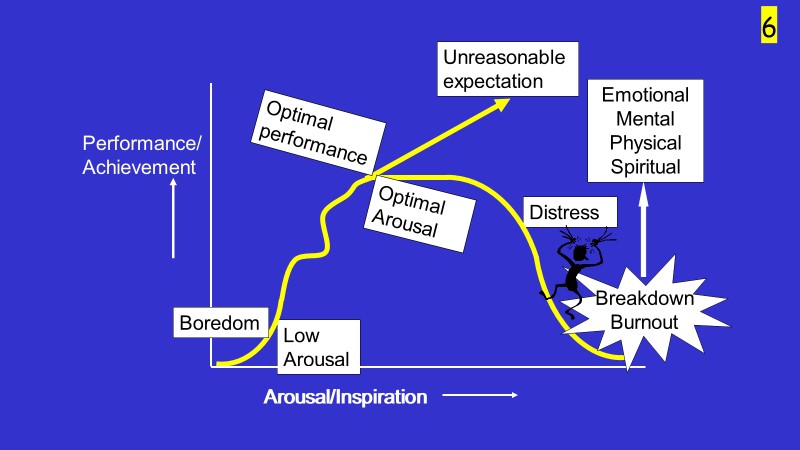
If you ignore the warning signs and struggle on, you will eventually ‘burn out’ and have a breakdown, as in slide 6. This will affect every aspect of your being so even simple things like getting dressed, eating or going out may be well-nigh impossible. It can take months to recover and perhaps you may never again be able to sustain your previous optimal performance.
Staged Help
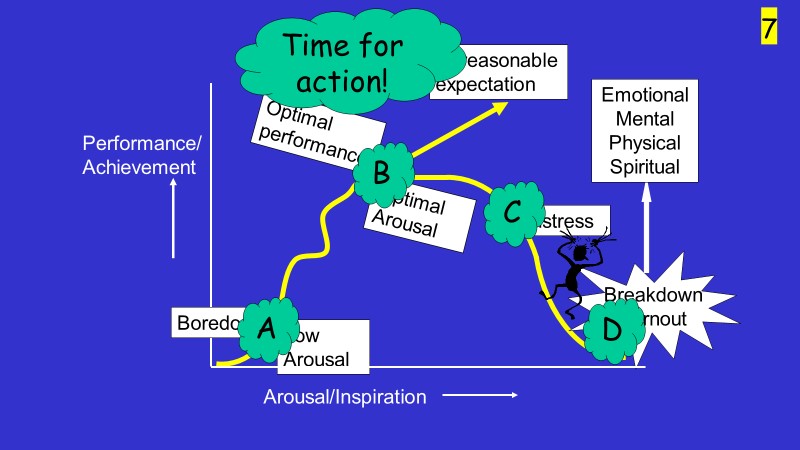
You need to take measures to prevent burnout – the earlier the better! In fact, at every stage there are things you can do to help you cope and to prevent the normal stresses of life become distresses.
A Boredom/low arousal stage.
Action depends on your resourcefulness and resilience. You will need the ability to rouse yourself from despondency and self-pity. But it will not come quickly or easily. In fact, you may need a period of despair when you think nothing can get worse, to motivate you to search for a way of escape or even to work out how you can use your present circumstances to discover a new strategy that takes advantage of what you initially had thought to be the utter pits.
Some stories to encourage you.
Zara did not like school so she left after GCSEs, though she had good marks and would have been welcomed into the Sixth Form. She had a choice of apprenticeships to take and took one in business administration in a manufacturing company’s office. The first week was interesting but after that there was little to learn so she was soon bored. She stuck it for 4 months as it was embarrassing after her initial enthusiasm but she became miserable and irritable and suffered from insomnia. One evening she had a meltdown. She wept, shouted and pulled out her hair. After a couple of hours she calmed down. She had to do something! She reflected on what had happened. She now knew clearly what she did not want to do and had some ideas about what she would like to do. She stayed up all night searching the internet for alternatives. Next morning she registered with an employment agency and told her boss she would be leaving soon. She had 4 interviews in the next 3 weeks and 3 apprenticeship offers. Within another 2 weeks she started a different apprenticeship and never looked back.
Victoria took time to recover from a difficult delivery so could not go out much for the first few months. In her boredom she rediscovered her teenage passion for writing poems and short stories. Some of her Facebook contacts were interested in what she reported and soon they started gathering in her home as an informal Writing Club. Others started writing too and it was not long before a few of them were having their work published as e-books. No one earned much but everyone found the venture deeply satisfying.
B Optimal arousal and performance.
When things are going well it is important not to take this for granted. Practice relaxation techniques, make lists and prioritise tasks. Try to keep something in reserve so you can cope with unexpected stressful situations.
Welcome the normal minor stresses of life. Yes, welcome them! These are excellent learning opportunities. When you recognise you may be in trouble take time out and do a major review. Explore ways to reduce the demands made of you and build up your resources.
C Distress.
When you know you are in trouble you need to take time out and do a major review. You then need to take drastic action to reduce the demands and build up your resources. A mini-collapse is recommended! It feels horrible. You will feel guilty and stupid. You are a failure. Yes! Accept the accusation, ‘I am a failure.’ But then, who said you must be successful all the time? Is there not some truth in the saying that we learn more from our failures than we do from our successes? Let me remind you of some famous comments about failure:
‘Failure should be our teacher, not our undertaker. Failure is delay, not defeat. It is a temporary detour, not a dead end. Failure is something we can avoid only by saying nothing, doing nothing, and being nothing.’ Denis Waitley.
‘Success is not final, failure is not fatal: it is the courage to continue that counts.’ Winston Churchill.
‘Every adversity, every failure, every heartache carries with it the seed of an equal or greater benefit.’ Napoleon Hill.
‘It’s fine to celebrate success but it is more important to heed the lessons of failure.’ Bill Gates.
‘Failure is simply the opportunity to begin again, this time more intelligently.’ Henry Ford.
Failure is the key to success; each mistake teaches us something. Morihei Ueshiba.
‘Failure is not fatal, but failure to change might be.’ John Wooden.
‘Our greatest glory is not in never failing, but in rising every time we fail.’ Confucious.
‘Failure is success if we learn from it.’ Malcolm Forbes.
‘Don’t be afraid to fail. Don’t waste energy trying to cover up failure. Learn from your failures and go on to the next challenge. It’s ok to fail. If you’re not failing, you’re not growing.’ H. Stanley Judd.
I hope that makes you feel better.
D Burnout.
 Burnout is devastating but even here there is hope. Here is a story to encourage you.
Burnout is devastating but even here there is hope. Here is a story to encourage you.
Douglas was a university lecturer who was tired of departmental jealousies, the distraction of unproductive administrative tasks and meetings seemingly for the sake of having meetings. His career progression had stumbled to a halt but he knew no other way of earning a living so he struggled on, miserably. One morning he could not get up to go to work. He could not even go to the loo. He felt dazed and wet the bed. The doctor came but could find no physical illness but nevertheless admitted him to hospital as a precaution. Lots of tests failed to reveal any abnormality but with the help of physiotherapists he slowly recovered. A psychiatrist diagnosed a dissociative stress disorder. He took sick leave and had treatment from a psychologist and gradually improved. He could not bear the thought of returning to his previous employment so retrained as a plumber and went self-employed so he could control his workload even though it meant he earned less. He was a meticulous worker, kept his promises and always explained what he found and the options available. He was highly valued in his community and became known as ‘The Professor.’
How Stress Develops – your personal reflection
 Before you move on, reflect on what you have learned in this chapter.
Before you move on, reflect on what you have learned in this chapter.
Where do you fit at present on the performance-arousal curve?
How do you recognise when you, personally, are taking on too much?
What have you done to ease the stress, relieve the burden and get help?
What worked best?
What else might you do when it happens again? Yes, it is ‘when’ not ‘if.’ Serious stress problems are inevitable at multiple points in your life.
What do you now recognise as the first symptoms of impending stress that could lead to a breakdown?
Have you ever had a breakdown or nearly had one? This can be a particularly painful memory to revisit so go carefully. Can you talk it over with someone? Perhaps with someone who was involved with you during that experience, someone who will be a sympathetic listener who will let you say your piece and help you reflect but without telling you their experiences or advising (you want their ears not their lips).
Endnote
The Performance-arousal curve is sometimes known as Yerkes-Dodson Law. It was first described in the Journal of Comparative Neurology and Psychology in 1907 by two American psychologists, Robert M. Yerkes and John Dillingham Dodson. It is used in Sport Psychology on the basis that athletes perform optimally with a degree of anxiety but with too much anxiety they can ‘choke’ and fail. Also, it can help understanding of how anxiety and over-preparation can cause an unexpected poor examination performance.
Now you know about this relationship between performance and arousal you may consider experimenting to see how much pressure you need to put yourself under to improve your performance. But be careful – if you overdo it there is a risk you may fail catastrophically.
